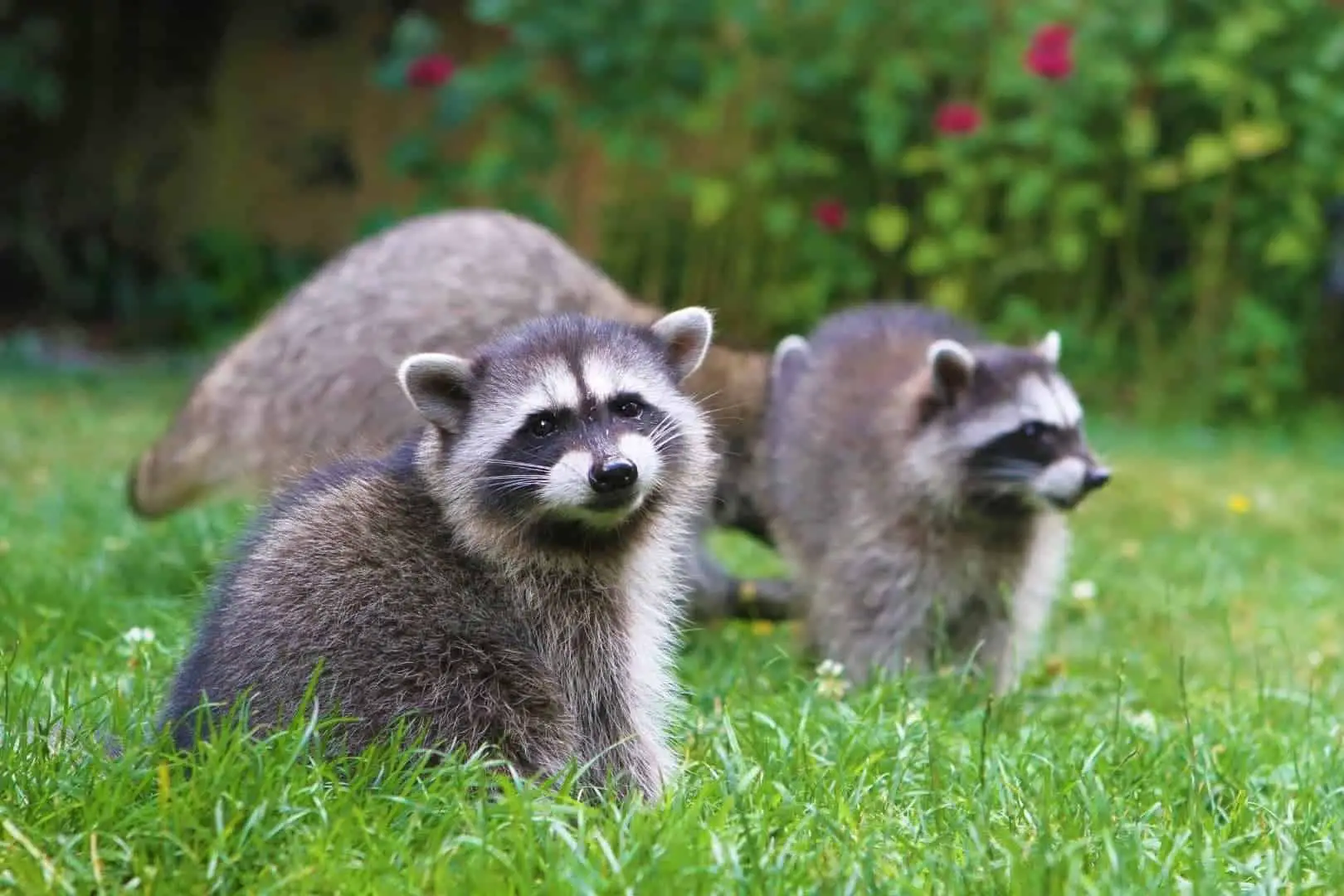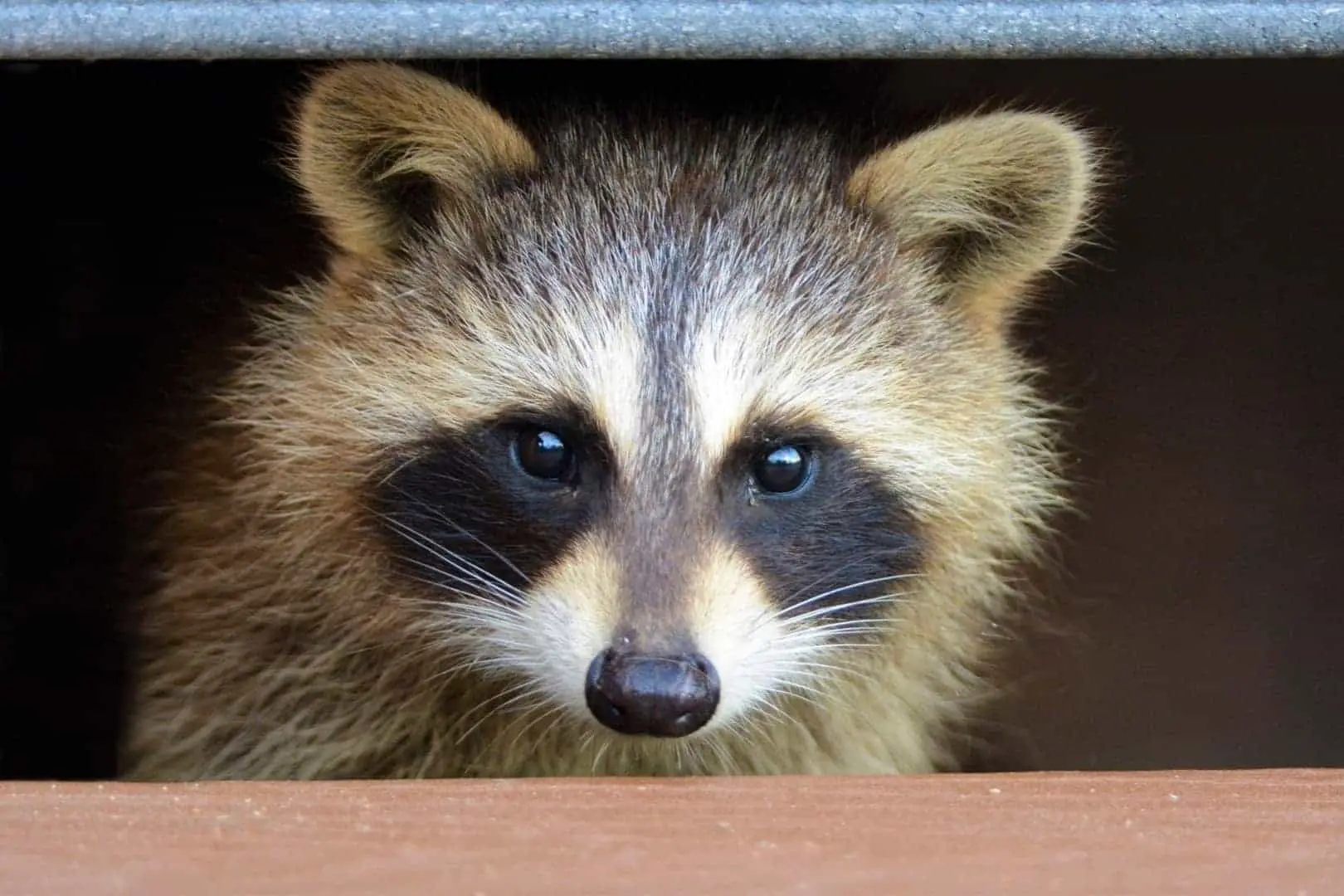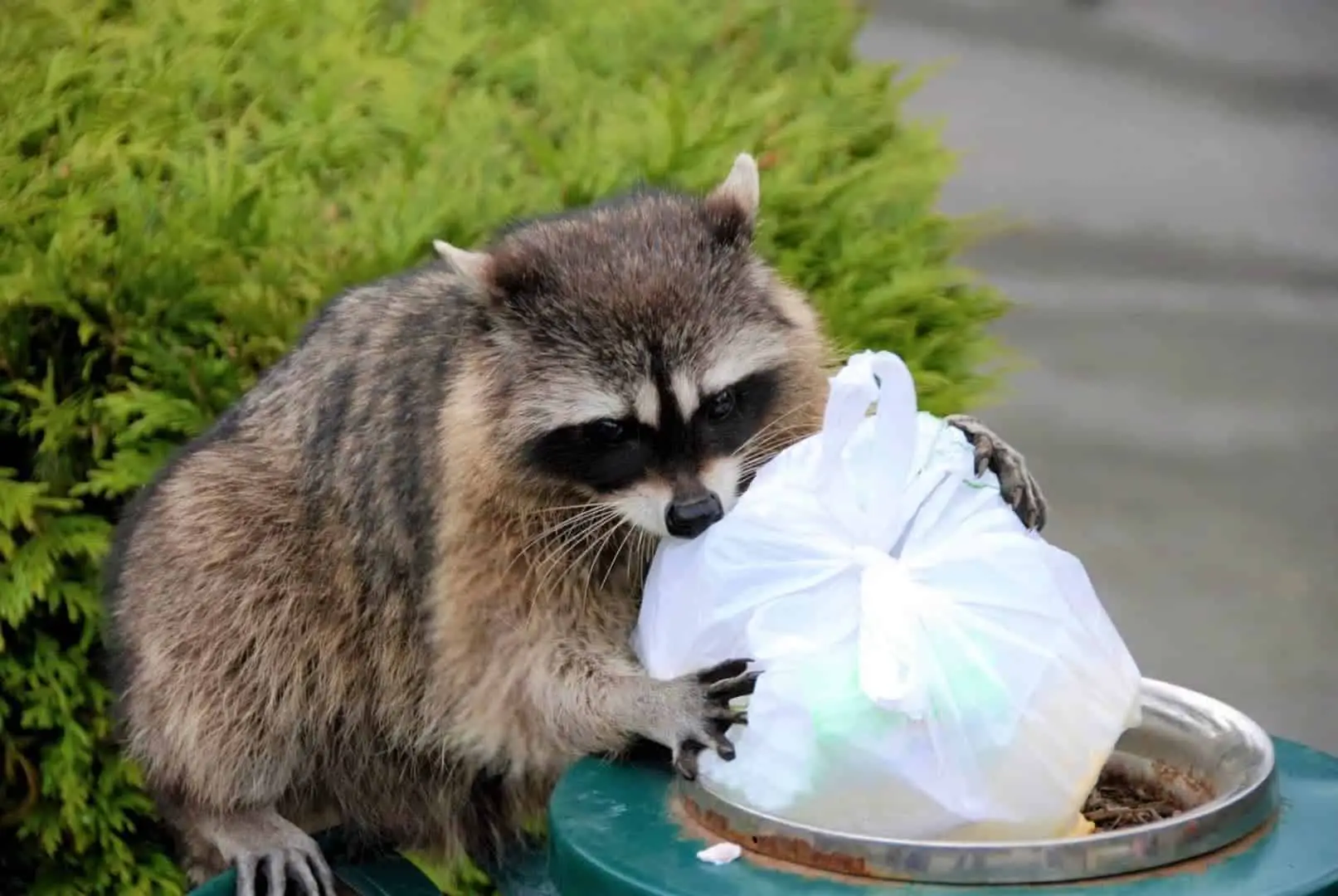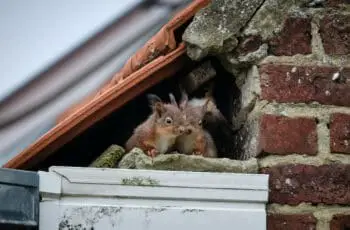While birds, fishes, insects, and reptiles breed through laying eggs, mammals breed by giving birth to young ones and breastfeed their babies, including raccoons and whales. Here’s how do whales breastfeed their calf.
With a short lifespan of about 2 – 3 years, these furry mammals give breed once a year and have more than one baby. However, female raccoons reach sexual maturity in 8 months while male raccoons will mature in the next year. But when do raccoons have babies, and how many babies do raccoons produce in a litter? Here’s the answer.
The Short Cut Answer…
With the winter hits, raccoons mating season begins when male raccoons mate with multiple females. After which, the female raccoons are pregnant for around 2 months (63 – 65 days), and when it’s finished, the female breeds and gives birth typically three to four (3 – 4) cubs in a litter but could give birth to 1-7 babies at a time. Female raccoons mostly give birth in the spring between March, April, May. The babies will be with their mother for about one year, but will leave the nest anywhere from 8 to 12 months. By this time, the female raccoons are sexually matured, but males will be sexually matured in the second year.
When Do Raccoons Have Babies? / When Are Baby Raccoons Born?

Raccoons Babies
After the mating season, the female raccoon will become pregnant for around two months (63 days), and when it’s finished, from the early spring in March and April to May, it will typically breed three to four cubs at a time but could give birth upto 7 cubs in a litter. Female raccoons produce babies once a year, but if they didn’t survive or the female didn’t breed, she will enter estrus again and give birth to another litter. The young raccoons will be with her mother for a year, and females will become sexually mature and leave the nest, but male raccoons will typically be with her mother and will reach sexual maturity in the next year.
The babies are born blind and deaf but with a little fur and can’t walk or run. In a month, particularly in three to four weeks, they will be able to walk but not climb and open their eyes and ears both and they can see, hear, and walk slowly. The cubs will usually live solitary when the mother is hunting. By two to three months old, the mother will stop breastfeeding and take the babies out for hunting with her mouth from the den. These young raccoons will spend some time learn hunting, climbing, swimming, fighting, and escaping from predators. In fact, raccoons are run incredibly fast and jump from an insanely high tree and building, here’s how high raccoons can jump and how far.
At five months old, they will be able to find food by themselves but will remain with his mother, and similar to his mother, these young raccoons will eat lots of food, building body fat for the winter. While raccoons don’t hibernate in winter, they do sleep long hours spending most of the time in the den with the family (with mother and siblings).
The baby raccoons typically leave the nest at 10 months but may also leave the nest at 8 to 12 months, so when the spring begins, some young raccoons will leave the nest. That’s when female raccoons are sexually matured and able to breed. But males will live with their mother until next year and reach sexuality matured in the second year. By this time they are mature, they can run, climb, swim, find food and adapt to the environment they live in. However, they eat everything they get, what about rabbits, do raccoons eat rabbits, here’s how.
That concludes with raccoons will have babies in the spring in March, April, and May. And the babies typically leave the nest at 10 months old but may also leave the nest at 8 or 12 months.
Here’s a quick video of a raccoon mom with its 3 babies.
Is Adopting Baby Raccoon A Good Idea?
With high intelligence and nimble paws, raccoons breed through giving birth to babies in the spring. The babies of these extremely adaptable mammals are ridiculously cute, furry, and dexterous, which leads to adopting one, but that’s probably a bad decision from many perspectives, primarily because they carry lots of parasites, worms, and pests. Check out Centers For Disease Control and Prevention for the detailed information.
Baby raccoons are called kits and are born blind and deaf, with both the senses appearing in the first month and could stand but don’t leave the den in the first few months. The kits are fast learners, and like its mother, they are good consumers but not hunters, instead, they prefer easy meals that would be birds nests or trash cans. Kits and its mother eats everything they get in the city and in the wild, however, can raccoons eat chocolate, do they like it, here’s the answer.
How Many Babies Do Raccoons Have In A Year Usually?
Raccoons usually give birth to three to four babies in a year, but they can have anywhere from one baby to seven babies at a time. Typically, the babies are born in the spring, starting from March to May.
What Month Do Raccoons Have Babies?
After raccoons mating season, male raccoons will live with the partner together for a few times, but with the winter arrives, it will leave the family and move to another den. Two months later, after mating, in the spring, female raccoons typically have three to four babies in March, April or May. The mother feeds, protects, and raise the young solitary without a father for 10 months until they become mature. Raccoons typically have more than one home that is called dens and move the babies to another den when there’s a threat or a problem. Despite that, the mother will also find new dens instead of creating and move the babies into it from predators, other raccoons, and humans.
The mother often ends up choosing warm and safe places that can be likely your attic. During this period, the mother will be entirely defensive, and while she is territorial, she will be extremely protective, so if there’s a threat, she will fight and may even kill huge predators like dogs.
How Long Do Baby Raccoons Stay In The Nest?
The domestic life of raccoons are well established and strong, so raccoons baby stay in the nest for around 1 year, and even after they leave, they will stay close to their mother especially female raccoons. The father leaves the mother after they mate and isn’t anywhere close even.
When Do Raccoons Mate? / When is Raccoons Mating Season?
Raccoons mating season begins from January and ends in June (but mostly happens in March). In this period, male raccoons expand their presence and territory to find a mate, and female raccoons enter the estrus cycle and produce a scent that attracts males that also makes male come to know from the scent that whether the female is in the estrus and ready to mate.
This way, male raccoons find a mate but newly matured males won’t be able to participate in this mating season due to the older males so they prevent stepping into it. After the existing males compete with each other over females, the winner will mate with a female first, and others will be next, as male raccoons can mate with several partners. The pair will live in the den together for some time but would soon move apart and the female will raise the young by herself. The father will be separate and move far away and won’t be with the mother when she’s pregnant and raising kits.
After the mating, the female will be typically pregnant for two months and would give birth typically to three to four, but could give birth upto 7 cubs in a litter. After they are born, the little kits will be around 1 year with the mother learning hunting and finding food skills. In this time, the mother is very aggressive and protective of threats and dangers and will attack, fight with predators even larger than her like dogs and even kill it.
What Do Baby Raccoons Eat?
When raccoons babies are born, the mother breastfeeds milk and will continue to breastfeed until three months. The mother will then stop breastfeeding and will take youngs out showing hunting and changing their diet. At this point, the babies could walk, run, and hunt with her mother’s help. When hungry or distressed, baby raccoons make chittering or cyring sound just like humans baby.
What to Feed Baby Raccoons?
If you’ve seen a baby raccoon, you may probably be tempted to adopt them into your home. Some people may also find orphan raccoons and wonder what do I feed these baby raccoons, here’s the answer.
You may feed baby raccoons milk bottle-fed like a baby (which is what her mothers feed, actually breastfeed them upto three months straight). You can feed 5 times a day in the first but decrease it to 3 times a day when they are 52.91 ounces. While it takes more than feeding her, but it’s probably one of the most important aspects.
How to Find Baby Raccoons in Your House

Raccoon In The Deck
Similar to squirrels, raccoons are destructive and may damage or at least mess up your home and more importantly they carry worms, diseases, and pests that are easily transmitted. After the mating season specifically 65 days later, in the spring mostly in April and May the mother will give birth but before it, the mother will find a home for the family, and anywhere in your house can be a perfect den for the family. However, they will choose a place where is dark, dry, warm, and more importantly safe where people don’t visit frequently like attics, under a shed, garage, or anywhere like that. During their search, they also make exterior damages to your property before when do raccoons have babies.
Signs that baby raccoons are in your house.
- Time of the year – Whenever raccoons are there that doesn’t mean, they will breed, but they might make or have made a den or winter den if there’s winter. The only time raccoons breeds are spring, so if you see a raccoon in this time, you can be sure that it is looking to nest or have already nested. Especially if you have seen a raccoon visited multiple times for a few days in the spring, you can assume the raccoon has already given birth.
- Property destruction – If you see some sort of damage like bent, paws signs and roof vent or some other damage on the attic, walls, under the shed in the spring, there’s probably a raccoon nesting in your house.
- Presence of raccoon(s) in your house – With raccoons gestation period ends, in the spring, the female will find a place for giving birth, and chances are that they will likely choose your attic. Despite raccoons are nocturnal, the mother will be also active in the day for hunting food as she requires more food than usual for feeding the babies through breastfeeding. And while the mama will be extremely protective of their babies, she will be monitoring and checking on the babies from close frequently. So whether you encounter a raccoon at night or day in this time of the year, it’s no other but the mother of the babies.
- Baby cry or chirp – Raccoons babies are very vocal and noisy like when hungry or in a threat, baby raccoons will make crying or chattering sound. They will consistently make cries, and chirps sounds which is similar to birds but a little bit different. Well, hearing that sound indicates the presence of the baby raccoons in your house.
- Raccoons vocals and noises – Aside from the baby sounds, raccoons make lots of different sounds, noises, callings, and vocalizations, so if you hear some sounds during the spring, raccoons are probably to blame.
- While raccoons mostly den in a burrow, watch out for burrow or signs of burrow around or even within your house in this time of the year. You may also look for other signs like scratches, scrape, vents, noises, holes, and other signs of a burrow or nest or materials of those in your property anywhere in spring.
If there’s one or more of these signs, here’s what you need to do.
What To Do
Raccons are opportunistic critters and while they have multiple dens but when giving birth, they are pickier about choosing and would probably nest in a warm and safe place. In which case, your attic is the best place to give birth. This incredibly agile animal usually breeds in April and May and once they have given birth, they won’t be leaving anytime soon, and they will be at least there for 3 months until the babies have at least partially grown up.
Nesting in an ideal place, the babies will be born blind, deaf, and could not stand on their feet but will be only able to make crying or chirping sound so you won’t see the babies until they are at least 3 months old. By 3 months old, they will be out for hunting and return to the nest so they won’t leave the home now. At this point, some moms change their den to another den, but that’s not guaranteed and they can be there for a year until the young raccoons have completely grown up.
However, if raccoons have nest up inside your home, you don’t probably want to kill, destroy their nest, or relocate the family to someone else property or in the wild which is also illegal. You neither want to separate the babies from her mother that will kill the babies without the mother and she will search biting, tearing, and ripping up around the places in your home that will result in more damage. Nor you can remove it.
If you come close to her kits, the mama that is extremely protective will attack and bite you brutally. Not only her but the whole family will start biting and her mother will bite the hardest, so don’t mess up with them or attempt to remove or ruin their nest. You’ve been warned!
But if left untouched, raccoons could make lots of destruction to your house like chewing wires, walls, floor, defecate and so many other damages that would definitely cost hundreds if not thousands of bucks.
Worse than that, the mama could choose the place to give birth for the next year in the spring, and maybe even her babies choose the place to breed in the next year and so on.
While there’s nothing you can really do about it except wait for the raccoons to leave the area itself, which might take as soon as 3 months or as late as a year or you can also call a removal service that would also cost you some money but less than raccoon’s destruction.
How to Prevent Raccoons From Breeding In Your House
While baby raccoons may seem cute, they are never good pets or even raised by her mother in your house. Similar to squirrels, they are very destructive and carry diseases and would mess up and make lots of damages to your property.
If raccoons have already made plenty of damage or you would simply want to prevent them and avoid those destructions, here’s what you can do about it. You can also get rid of raccoons with these steps. You can’t really do anything when they are there but only do this steps after they’ve left the area or haven’t come yet.
Patch Up The Holes, Weak Spots & Their Entrance
- First and foremost, fix and clean up the mess like removing their nest and trashes and then restore, repair, or maybe reconstruct the damages. While they have been there for quite a while, they have likely made damages and holes so fix up those things and patch all the holes and ways from where they come including your fence holes and as well as fix and patch all their entrance of yard and from where they come into your house, yard and attic. Make sure there are no holes, signs, ways, damages, pit, their entrance and patches then move to the next step.
Get Rid of Their Food Source
- The second step is to get rid of the raccoon’s food source. If there’s some food or their food source, it will probably attract raccoons that will also lead to nesting and raccoons nests and make dens wherever there is a food source nearby. If you were feeding raccoons, stop feeding it first.
Set up Trash Bins
- The most common and used raccoon’s food source is trash or garbage bins. If you don’t know, raccoons have a large diet and eats worst food including roadkill, food waste and they even eat chocolates which are toxic for them. There are a few things you can do with the trash bin. First, wash the trash bins with soap then put the food waste always in double-bag and close the bags. Also, lock the lid. That will remove the scent of the food and will also unable raccoons to open it. Despite they might know where the trash bin, you may lock the lid of the garbage bin so when the raccoon tries to open, he won’t be able to do that.
- With this trick, you can put your trash bin outside without attracting raccoons but with that, though, you should never put the trash bins at night because that’s when raccoons are most active. Coming for food will lead to making nests, which can be winter den or dens for babies, so if you wash your garbage bins and double-bag and close the lid, you’ve eliminated the risk of their arrivals. While raccoons make nests where they are near to the food source that is your trash bin and compost bin, and by getting rid of their food source, they won’t come in, and as a result, they will be out of your house.

Raccoon pulling trash
Remove Pets & Other Food
- The next step would be to remove the pets food, birds food or whatever food is there. While raccoons are omnivores, they will eat literally anything including pets, birds, chickens, and rabbits food or any sort of food. If you’ve chickens, you can also patch up the holes of the wire but with that though, they might tear up the wire, so better than that, you can electrify your chicken coop with one strand of electric tape or wire six inches off the ground on the outside of the coop all the way around. But also ensure that your chicken wire is high enough so they can’t jump in. And while raccoons are big enough, they won’t be able to make a tunnel to get into. You can also have a farm dog in the yard at all times and it will chase raccoons out of the yard. It will probably save your chickens from raccoons and other predators.
While there are many ways for it but we’ve chosen and described the working ways only. There are also repellants for raccoons and you can use it as well, and some people use owls statue for scaring them as raccoons are afraid of them and both of them are also nocturnal. But taking these steps will certainly prevent raccoons.
FAQ
Q: How Often & When Do Raccoons Have Babies?
Smaller cousins of bears, raccons will have babies once a year only, unless the babies die or are killed or are lost by its mother.
Q: How Long Do Baby Raccoons Stay With Their Mother?
From birth to maturity, baby raccoons will stay around one year with their mother but some leave earlier than a year and some more. Female raccoons will reach sexual maturity in a year while male raccoons will sexually mature in the second year.
Q: How Many Babies Do Raccoons Have At One Time?
Raccoons can have one to seven babies at a time but raccoons have typically three to four babies at a time.
Q: Where Do Raccoons Make Their Nests?
Although raccons have three to four dens, they would pick a new nest where it is warm, dark, near to the food sources and more importantly safe from predators, humans, and other raccoons and give birth there.
Q: How Often Do Baby Raccoons Eat?
When baby raccons are born upto 3 months, the mother will breastfeed three to five times a day by her mother.



No Responses